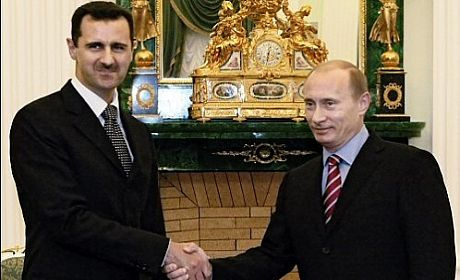Russia’s Probable Refusal to Militarily Intervene in Syria

Following the chemical attack on civilians in Damascus, the US and its allies are apparently moving closer to an attack on Syria. On the other hand, Russia believes that the usage of chemical weapons by the Syrian government is just a pretext and opposes any attack on this country. We asked Dr. Mahmood Shoori, an expert on Russian affairs, about his opinion on what approach Russia will take with regard to a US attack on Syria.
It seems that the world and the region are preparing themselves for an attack on Syria. Previously, Russia had taken two different approaches with regard to US attacks on Libya and Iraq, one of opposition and one of cooperation. What will Russia’s approach be on the issue of Syria?
Russia’s reaction depends on the type of attack carried out by the US and its allies. If the attack launched by the West is limited to missile attacks on some centers in Syria, Russia’s reaction would also be limited and it would only condemn such an attack and take some diplomatic measures. This means that, in the international scene, Russia attempts to unite the countries which have a similar approach towards Syria to show its opposition to the measure taken by the West. But if the West’s military action in Syria is more serious and leads to the entrance of West’s military forces into Syria, it seems that this issue would make conditions for Russia more difficult and put it in a situation where it would be forced to take measures which have not been seen since the end of the Cold War.
Do you mean that Russia might enter the war? Some believe that an attack on Syria could lead to a world war.
No. What I mean is not Russia’s military intervention. Russia will certainly increase its military assistance to Bashar Assad and its supporters or change the balance of power to its own benefit. This might be seen in Russia’s relations with Iran or other countries. What is obvious is that the western countries intend to use this opportunity to destroy the structures and substructures of the Syrian army and this is against what Russia wants.
What is the reason behind Russia’s opposition?
The Russian army is among the few remaining armies which has a Russian structure. The Syrian army had ideological and military dependence on Russia. The West intends to destroy the military substructures in Syria. The same thing happened in Iraq and Libya. We saw that in these two countries the West sometimes attacked the substructures of the armies to destroy their military capabilities and their dependence on Russia.
What impacts will this issue have on US-Russia relations?
During recent years, particularly after the second term of Putin’s presidency, US-Russia relations maintained a semi-tense situation. Since Putin came to power the second time around, the US and many radical groups of this country started to criticize Russia for suppressing its opponents. These behaviors impacted Russia’s interactions with the US and intensified Russia’s suspicions with regard to the US. Therefore, since Putin came to power, relations between the US and Russia have practically become less friendly. Of course, certain issues have also helped this matter, the last of which was the asylum Russia granted to Edward Snowden, the former CIA agent, who had fled the US after disclosing information about the US’ secret electronic surveillance. Another issue which has impacted these relations has been the issue of Syria which has led to increasing tension day by day. The attack of the US and its allies could be another page in the dossier of tensions and crises between the two countries.
It seems that the West does not pay attention to Russia’s opposition. What do you think the reason is?
Perhaps this issue is related to solving the economic crisis in the West, particularly in Europe. During the economic crisis, the West managed to have better relations with Russia when Medvedev was president. But after removing this crisis, the issues which encouraged the US and Russia to expand bilateral cooperation were practically pursued less. What we see today in these relations is that both sides attempt to maintain this cooperation to maintain security in the world. Although relations between the two countries still continue within the framework of economic cooperation, it seems that this cooperation have not been able to help the improvement of relations. What is clear is that the ruling psychological atmosphere over US-Russia relations during the past two or three years has become so heavy that it does not allow movements that intend to cooperate to be highlighted and established. The same impact can clearly be observed in the issue of Syria and both sides cannot agree on general issues, thus, if the US attacks Syria, tensions between the two countries will be intensified.

